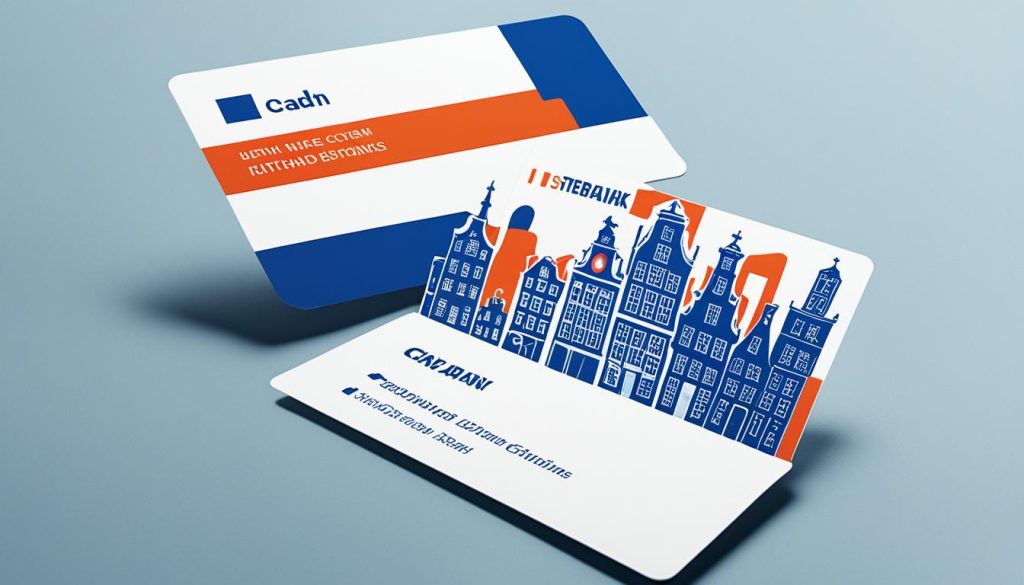Starting a company in the Netherlands is a great chance for keen business minds. Non-EU citizens need to get the right residence permits to start smoothly. The country has a special permit just for foreign startups that are doing something new.
This helps these startups fit in and grow. Also, you must have an address and a business bank account there. The Dutch Banking Association’s Quick Scan is there to see if you can start. The Netherlands has good policies and a strong business setting, making it perfect for starting a business.
Key Takeaways
- Non-EU entrepreneurs need to apply for temporary and permanent residence permits.
- Innovative startups can qualify for a tailored residence permit.
- A physical address and a business bank account in the Netherlands are mandatory.
- Tools like the Dutch Banking Association’s Quick Scan aid in assessing eligibility.
- The Netherlands offers a supportive environment for entrepreneurship.
Introduction to Starting a Business in the Netherlands

The Netherlands is a highly appealing place for people wanting to start their own business. It offers strong support for entrepreneurs. Also, there’s a good set of resources for new businesses. Plus, the steps to start a Dutch company are clear and doable with the right help.
Understanding administrative tasks is vital in the Netherlands entrepreneurial guide. For expatriates, it usually starts with getting the right residence and work permits. These permits are critical as they allow you to set up a legal business. You might have to apply for different permits to live and work there.
Choosing the right legal structure for your business is another essential step. This affects your taxes and liability. You can choose from sole proprietorships, partnerships, or incorporated entities. Each option has different legal and tax implications.
Don’t forget the importance of a business bank account. It’s a key step in starting a Dutch company. A separate account makes financial management easier. It keeps personal and business finances separate, simplifying accounting and tax tasks.
The guide also stresses the importance of having a local business address. It adds credibility and meets Dutch regulations. The location of your business can affect access to resources, markets, and networking opportunities.
In conclusion, starting a Dutch business involves several steps and legalities. However, the supportive environment in the Netherlands makes it a rewarding journey. With careful planning and following the rules, entrepreneurs can build a successful future in the Dutch market.
Understanding the Dutch Market and Business Climate

If you want to do well in the Netherlands, it’s crucial to understand their business culture and market. The Netherlands is known for its progressive and welcoming market. But, it’s important to respect local customs and practices.
Key Cultural Considerations
When doing business in the Netherlands, remember a few key cultural points. The Dutch appreciate being direct and clear in business. This helps build trust and keeps everyone informed. Being on time is also very important; they expect you to stick to schedules and deadlines.
Another important aspect is the Dutch way of making decisions. They like to get everyone’s opinion to reach a consensus. This approach helps the team bond and come up with better solutions by considering different viewpoints.
What to Avoid in Dutch Business Practices
There are things you should avoid in Dutch business. Don’t promise more than you can deliver. The Dutch value reliability and keeping promises. They also don’t follow a strict hierarchy, so acting too formal might not be well-received.
Be careful about personal space too. The Dutch keep their professional and private lives separate. It’s best to avoid getting too personal too quickly.
Understanding and respecting Dutch business culture will help you succeed in the Netherlands. It will enable you to build stronger and more productive business relationships.
Legal Requirements for Starting a Company in the Netherlands

Starting a business in the Netherlands requires an understanding of local laws. Non-EU entrepreneurs must make sure they can legally stay. They often need a provisional residence permit (MVV) and a work permit (TWV). These permits let business owners live and work in the country legally.
Residence and Work Permits
Getting residence and work permits is important for Dutch company registration. The TWV allows non-EU nationals to legally work in the Netherlands. Without these permits, doing business in the country is almost impossible.
Self-Employed Residence Permit
The self-employed residence permit uses a points system. It checks if the business benefits the Dutch economy. This helps with innovation and economic growth.
Startup Visa for Entrepreneurs
The startup visa, started in 2015, helps international entrepreneurs. It’s for those wanting to start their business in the Netherlands. This visa helps with the first steps of business development.
Choosing the Right Legal Structure for Your Business

Choosing the right legal structure is key for entrepreneurs in the Netherlands. It affects your taxes, how much you’re liable for, and your flexibility. Each Dutch company structure is different, so understanding these differences is crucial.
Overview of Dutch Legal Business Forms
The Dutch company types fall into unincorporated and incorporated groups. Each has pros and cons, affecting how much liability you might have.
Unincorporated Business Structures
Unincorporated business structures include sole proprietorships and partnerships. These are simpler to set up. However, there’s no separation between your personal and business assets.
Because of this, you are personally responsible for any business debts. These structures suit smaller, less risky businesses best.
Incorporated Business Structures
In contrast, incorporated structures in the Netherlands protect your personal finances better. The most known forms are the private and public limited companies. They have more rules but protect you from personal liability, beyond your investment in the business.
They’re ideal for larger companies with big ambitions and more at stake. Understanding Dutch company types helps pick the best structure for your goals. This ensures a good balance between risk and growth potential.
Steps to Registering Your Business with the KvK

Registering your business with the KvK is vital for entrepreneurs. This step makes your venture official in the Netherlands. It helps if you know what you need and get ready for it. Doing so will make the KvK sign-up smoother.
Preparing Your Registration Documents
Gathering the right papers is your first job. You’ll need a unique name for your business and a clear activity description. Check the KvK’s website to make sure no one else has your chosen name. For those not forming a company, you can send your documents straight to the KvK. But if you’re setting up a company, you’ll need to visit a notary.
Booking Your Appointment
The last step is setting up a meeting with the KvK. This appointment is a must. They will go over your documents to confirm all is correct. It’s wise to book early as the KvK gets busy.
Opening a Business Bank Account in the Netherlands

Starting with a separate bank account is key for your business’s health. It makes bookkeeping easier and keeps your private money safe from company debts. Also, it’s essential for following Dutch laws and building trust with those you do business with.
Why a Separate Learn Business Account is Important
Having a dedicated business account in the Netherlands helps you manage money better. You can easily keep track of what you earn and spend. This makes doing your taxes simpler. Plus, it keeps your private assets safe if your business runs into trouble.
Popular Banks for Entrepreneurs
Many well-known banks in the Netherlands, like Finom, bunq, and Wise, offer services made for businesses. They provide accounts that are easy to manage, affordable, and digitally friendly. They help your business grow by making money management more straightforward.
Choosing a bank means looking at fees, account tools, and extra offerings like loans or advice. Make sure your invoices are correct, showing your company’s details and VAT numbers. This is crucial for meeting Dutch tax laws.
Essential Elements of a Business Plan

Making a detailed business plan is key to start and grow a business in the Netherlands. This plan is like a map. It helps business owners find their way in the Dutch market and reach their money goals.
Setting Clear Business Goals
First, you need clear business goals. They must be specific, measurable, achievable, relevant, and time-bound (SMART). Goals like increasing market reach, making customers happier, or raising sales help you make smart choices. They also let you check how well you’re doing.
Defining Your Market and Audience
Knowing your market and who you’re selling to is crucial for success in the Dutch market. Do your homework to understand your potential customers’ likes, needs, and habits. Figure out where you stand among competitors and who your customers might be. This info helps you plan your marketing and business moves to meet demand.
Financial Projections and Planning
Good financial forecasts and planning are must-haves in a business plan. You should map out where you’ll make money, your costs, and how you’ll manage cash flow. These financial targets attract investors or lenders and are marks to gauge your business’s financial wellbeing and future.
By including these key parts, business owners will be set to succeed in the dynamic Netherlands market.
Navigating Dutch Tax Obligations for Your Business

Understanding Dutch tax rules is key for businesses in the Netherlands. You’ll need to know about different taxes to stay compliant. This includes registering with the Belastingdienst for VAT purposes.
Types of Taxes to Consider
Starting a business in the Netherlands means dealing with various taxes. Here are the important ones:
- BTW (VAT): This is a tax on goods and services. It’s vital to know how VAT works for your business.
- Income Tax: This applies to individuals and partnerships. It’s based on your income.
- Corporation Tax: For companies, this tax is on your profits.
- Payroll Tax: If you employ people, there are taxes on their wages.
How to Register with the Belastingdienst
To comply with Dutch tax laws, registering your business is essential. Here’s how:
- Initial Registration: Start by registering at the KvK. They’ll send your details to the Belastingdienst.
- VAT Deduction: After registration, you can deduct VAT on business purchases. This helps in the beginning stages.
- Monitor Deadlines: Always submit tax returns on time. This is crucial for managing your taxes correctly.
Knowing about Dutch tax obligations helps you follow the law and manage money better.
Obtaining Necessary Licences and Permits
Meeting Dutch laws is key to doing business successfully in the Netherlands. Getting the correct business permits Netherlands is essential to stay out of legal trouble. Each company has different needs, so it’s important to research your industry well.
Some companies might need general permits, whereas others require more specific company licences. Making sure you have the right permits for your business type is crucial to follow Dutch regulatory compliance. High-standards industries, like food service, environmental management and healthcare, demand strict licencing.
If you’re opening a restaurant, you’ll need to get hygiene and food safety permits. A construction business will have to secure building permits and safety certifications. Also, online businesses should obtain e-commerce registrations and meet data protection rules.
Having all necessary business permits Netherlands keeps your business legally safe and builds trust with customers and partners. Therefore, be well-prepared by understanding specific Dutch regulatory compliance rules. This will help your business run smoothly in the Netherlands.
Opening Your Business in the Netherlands as a Non-Resident

Starting a business in the Netherlands as a non-resident is doable, but there are certain rules. Knowing these rules and steps is key to launching a successful venture in this vibrant European market.
Criteria for Non-Residents
If you’re a non-resident wanting to start a business in the Netherlands, you must meet a few requirements. First, your business must carry out ongoing activities in the country. Also, getting the right visa and residency permits is crucial. Some may need to apply for a startup visa meant for entrepreneurs. Following the Dutch tax rules, keeping proper records, and proving your business model works are all important.
Address Requirements
One key requirement is having a real business address in the Netherlands. Your business must have a physical address, not just a PO box, for registration. This address is used for legal and admin tasks. Make sure your business location fits the activities you’ve described in your documents.
Giving non-resident entrepreneurs clear information about starting a business helps a lot. By following the address rules and other key requirements, you can make your business flourish in one of Europe’s top economies.
Managing Business Administration and Record Keeping
Running a successful business in the Netherlands relies on effective administration. You must follow Dutch record-keeping laws to stay legal. This means documenting all business actions accurately and thoroughly.
Keeping Your Records Up-to-Date
Keeping records current is vital in business admin. In the Netherlands, you have to keep records like invoices and bank statements for at least seven years. Keeping these documents updated ensures they’re ready for any audits or checks.
Digital Versus Paper Records
Choosing between digital and paper records is important. Though paper was once common, digital records offer more efficiency and order. Digital methods make it easy to search, share, and store documents. Yet, it’s critical to back up digital records securely to avoid losing data.
Professional Services to Assist in Business Formation
Starting a business in the Netherlands can seem tough. This is especially true if you’re not familiar with Dutch rules. Using professional services can make everything easier. They help with important steps like picking the right legal structure, registering with tax offices, and following local laws. With their help, you can concentrate on building your business while they take care of the paperwork.
Entrepreneurs looking for full support will find it valuable to get help in the Netherlands. This includes getting the necessary permits and opening a business bank account. These services provide custom solutions for your business needs. They help both new startups and those looking to grow in the Dutch market. With their aid, entering the Dutch business scene becomes less of a hassle.
Getting help with company incorporation can also be a big advantage. It helps you understand complex legal requirements and the steps needed to form a company. These services support you at every phase of starting your business. They make sure every detail is covered and all legal duties are met. Working with experts familiar with Dutch business rules reduces risks. It helps set a strong base for your business in the Netherlands.
FAQ
Q: What are the initial steps for starting a company in the Netherlands?
Q: What kind of permits do I need to work and stay in the Netherlands as a non-EU entrepreneur?
Q: What cultural aspects should I consider when doing business in the Netherlands?
Q: What are the available legal business structures in the Netherlands?
Q: How do I register my business with the KvK?
Q: Why is a separate business bank account important, and what are some options?
Q: What should be included in a business plan?
Q: What types of taxes must I consider when starting a business in the Netherlands?
Q: Do I need specific licences and permits for my business?
Q: Can I start a business in the Netherlands as a non-resident?
Q: How should I handle business administration and record-keeping?
Q: What professional services can assist in setting up my business?
Source Links
- https://business.gov.nl/starting-your-business/various-starting-points/starting-a-business-in-the-netherlands-from-abroad/
- https://www.iamexpat.nl/career/entrepreneur-netherlands/how-to-start-up-own-business
- https://business.gov.nl/starting-your-business/checklists-for-starting-a-business/how-to-start-a-business-in-the-netherlands-a-checklist/







